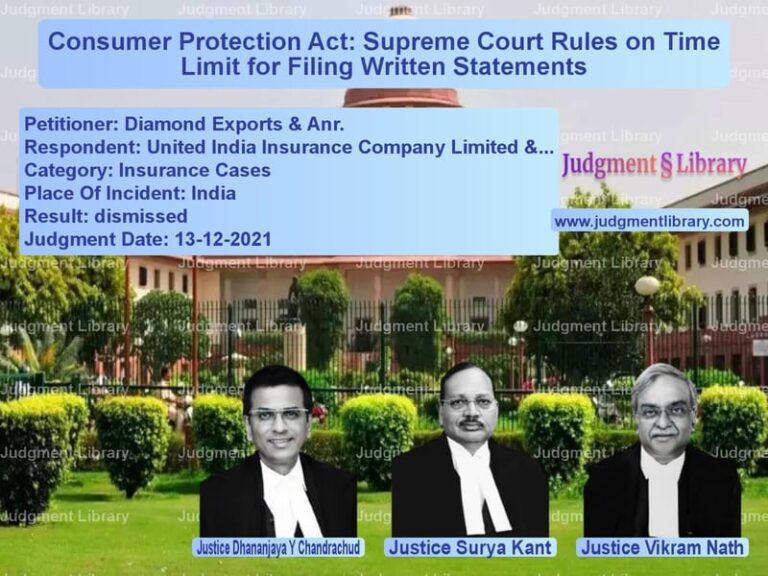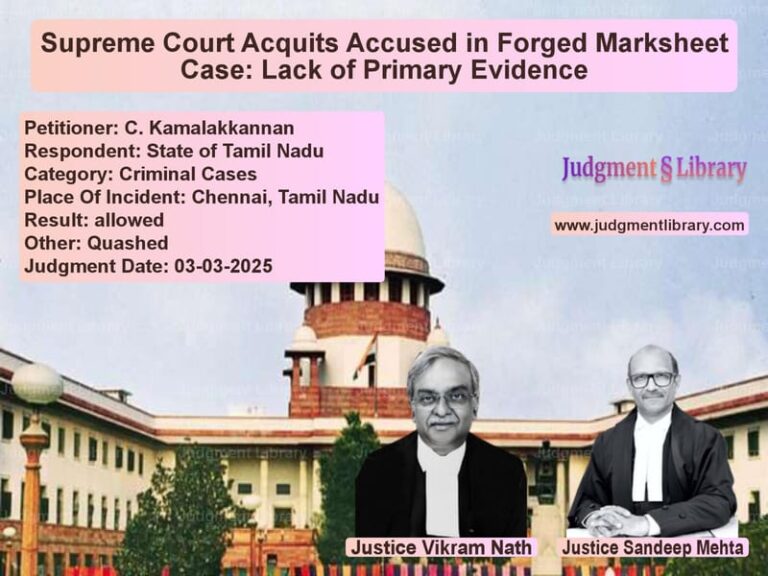Anticipatory Bail for an Accused Already in Custody: Supreme Court’s Landmark Ruling in Dhanraj Aswani vs. Amar S. Mulchandani
The Supreme Court of India in Dhanraj Aswani vs. Amar S. Mulchandani & Anr. addressed a critical legal question regarding the maintainability of anticipatory bail under Section 438 of the Criminal Procedure Code (CrPC) when the accused is already in custody for another offense. This case clarifies the rights of an accused in seeking protection against arrest in different cases while under judicial custody.
The issue arose from a dispute where the accused, Amar S. Mulchandani, was already in custody concerning an Enforcement Directorate (ED) case but sought anticipatory bail in another criminal matter. The Bombay High Court had granted relief, leading to an appeal before the Supreme Court.
Background of the Case
The primary legal question before the Supreme Court was:
“Whether an application for anticipatory bail under Section 438 of the CrPC is maintainable at the instance of an accused while he is already in judicial custody in connection with his involvement in a different case?”
The facts of the case are as follows:
- Respondent Amar S. Mulchandani was arrested in connection with ECIR No. 10 of 2021 by the Enforcement Directorate (ED).
- While in custody, he apprehended arrest in CR No. 806 of 2019 registered at Pimpri Police Station for offenses under Sections 406, 409, 420, 465, 467, 468, 471 read with Section 34 of the IPC.
- He applied for anticipatory bail in the Bombay High Court, which ruled in his favor.
- The complainant, Dhanraj Aswani, challenged this decision in the Supreme Court.
Arguments Presented
Arguments by the Appellant (Dhanraj Aswani)
- A person already in judicial custody cannot apply for anticipatory bail because they are already under arrest.
- Section 438 of the CrPC requires a “reason to believe” that the accused may be arrested, which does not apply to someone already in custody.
- If anticipatory bail is granted to a person in custody, it would be impossible to fulfill the condition of appearing for interrogation as per Section 438(2).
- An accused fearing arrest in another case can instead apply for regular bail under Sections 437 or 439.
Arguments by the Respondent (Amar S. Mulchandani)
- The right to apply for anticipatory bail is linked to Article 21 of the Constitution (Right to Life and Liberty).
- Being in custody for one case does not preclude an individual from seeking protection in another case.
- Anticipatory bail is not restricted by Section 438 except in cases explicitly mentioned (e.g., sexual offenses under Section 438(4)).
- The accused has the right to avoid arrest and harassment in multiple cases through anticipatory bail.
Divergent Views of High Courts on the Issue
The Supreme Court analyzed various High Court rulings on the maintainability of anticipatory bail applications for accused persons already in custody:
- Rajasthan, Delhi, and Allahabad High Courts: Held that anticipatory bail cannot be granted to a person already in custody.
- Bombay and Orissa High Courts: Held that anticipatory bail is maintainable even if the accused is in custody for another case.
Supreme Court’s Ruling
The Supreme Court, comprising Justice J.B. Pardiwala, Chief Justice D.Y. Chandrachud, and Justice Manoj Misra, held:
- Anticipatory bail under Section 438 of the CrPC is maintainable even if the accused is in custody in another case.
- Merely being in custody in one case does not eliminate the apprehension of arrest in another.
- Police can formally arrest an accused in judicial custody for another case. The investigating agency must obtain a Prisoner Transit (P.T.) Warrant to take custody.
- The court should not impose restrictions on anticipatory bail beyond what is explicitly mentioned in the CrPC.
- Anticipatory bail applications must be decided on their merits, and denial should not be based solely on the fact that the accused is in custody in another case.
Key Takeaways from the Judgment
- Anticipatory bail is a statutory right under Section 438 and should be accessible to an accused even while in custody for another case.
- Judicial custody does not prevent an accused from facing new allegations in separate cases.
- If granted anticipatory bail, the accused cannot be remanded to police custody but may still face judicial proceedings.
- Courts must ensure that procedural laws are interpreted in a manner that protects individual liberty.
Conclusion
The Supreme Court’s ruling in Dhanraj Aswani vs. Amar S. Mulchandani establishes a crucial precedent in criminal jurisprudence. It affirms that anticipatory bail remains available even to individuals already in custody in another case. This ensures that procedural laws do not become an instrument for unjust detention or harassment. The decision also reinforces the principles of personal liberty, ensuring that an accused has the right to seek protection against arrest in multiple cases.
Petitioner Name: Dhanraj Aswani.Respondent Name: Amar S. Mulchandani & Another.Judgment By: Justice J.B. Pardiwala, Justice D.Y. Chandrachud, Justice Manoj Misra.Place Of Incident: Pimpri, Maharashtra.Judgment Date: 09-09-2024.
Don’t miss out on the full details! Download the complete judgment in PDF format below and gain valuable insights instantly!
Download Judgment: dhanraj-aswani-vs-amar-s.-mulchandani-supreme-court-of-india-judgment-dated-09-09-2024.pdf
Directly Download Judgment: Directly download this Judgment
See all petitions in Bail and Anticipatory Bail
See all petitions in Judgment by J.B. Pardiwala
See all petitions in Judgment by Dhananjaya Y Chandrachud
See all petitions in Judgment by Manoj Misra
See all petitions in dismissed
See all petitions in supreme court of India judgments September 2024
See all petitions in 2024 judgments
See all posts in Criminal Cases Category
See all allowed petitions in Criminal Cases Category
See all Dismissed petitions in Criminal Cases Category
See all partially allowed petitions in Criminal Cases Category







